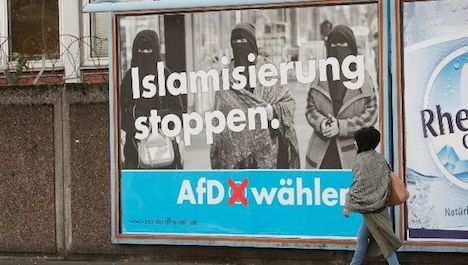Germany's hard right is set to make gains in the elections next week as polls reveal the far-right Alternative for Germany, or AfD, is polling in third place. AfD has grown in popularity as mounting resentment toward Chancellor Angela Merkel's migration policy feeds the political movement accused of harboring Nazi revivalist ambitions. With 12 percent of voters favoring the fiercely anti-immigrant party, the AfD is nipping at the heels of the co-ruling Social Democrats (SPD) who are polling at 20 percent, according to a poll published Thursday by ARD-Deutschlandtrend. While Merkel's Christian Democrats (CDU) are seen by German constituents as a safe and predictable bet, polling comfortably at 37 percent, the AfD seems to be on a course to overcome the five percent threshold needed to gain parliamentary representation and become the largest right-wing nationalist group to enter the Bundestag since the end of World War II. "If the AfD actually makes it into the Bundestag, Nazis will speak in Reichstag for the first time in over 70 years," Foreign Minister Sigmar Gabriel told Der Spiegel, noting that the “right-wing radicals shamelessly exploit these failures” of the government to handle both the refugee crisis and the social welfare needs of the German populace. However, studies of the group have shown that the party's support base consists by-and-large of prosperous members of the middle class whose politics don't consist of anxiety over “economic globalization, nor economic need, but a perceived lack of positive national self-consciousness and a perceived decline of German cultural identity,” according to analyst Julian Gopffarth. Founded in 2013 and originating in a conservative group of anti-euro academics, the group has weathered various storms to rally the country's right through calls for Germany to shut its borders immediately, immediately curb immigration into the country, and a raft of other policies such as banning minarets on mosques. The AfD could end up as the largest opposition group in the parliament if the incumbent ruling coalition of Merkel’s conservatives and Social Democrats SPD re-forms, which is a likely scenario. That would put the group in the position of chairing the powerful budget committee and opening the general debate during budget consultations, giving prominence to its alternatives to government policies. Georg Pazderski, a member of the AfD’s executive board, told Reuters his party would use parliamentary speeches to draw attention to the cost of the migrant crisis, troubles in the euro zone - which the AfD wants Germany to leave - and problems related to the European Union. “We’ll have a voice when we’re in parliament,” he said. “We won’t be an easy opposition.” The party's poll numbers fell earlier this year, a trend largely credited to government and mass media efforts to tame the passions of anti-migrant fervor by reframing the migration debate and slow asylum applications, as well as a string of embarrassing scandals shedding light on internal dissension within the party. The AfD has managed to bounce back from its setbacks by consistently focusing on a radical right-populist promise of a Germany that can “reclaim its past” and aggressively represent the average Germans left out by a globalizing world and the CDU-SPD coalition's efforts to address the migratory crisis caused by the war on Libya and civil war in Syria. “We’re gradually becoming foreigners in our own country,” leading AfD candidate Alexander Gauland told an election rally in the Polish border city of Frankfurt an der Oder. A song with the lyrics “we’ll bring happiness back to your homeland” blared out of a blue campaign bus and the 76-year-old lawyer said Germany belonged to the Germans, Islam had no place here and the migrant influx would make everyone worse off. Gauland provoked outrage for saying at another event that Germans should no longer be reproached with the Nazi past and they should take pride in what their soldiers achieved during World War One and Two, similar to how the French are proud of Napoleon and Britons take pride in Winston Churchill or Horatio Nelson. The Nazis ruled Germany from 1933 to 1945, during which time they killed 6 million Jews, over 9 million other ethnic-religious minorities and political opponents, and invaded countries across Europe in an aggressive campaign claiming countless more lives. Bjoern Hoecke, who is accused of leading the party's right wing, has denied that Adolf Hitler was “absolutely evil”, described Berlin’s Holocaust Memorial as a “monument of shame” and demanded a “180-degree turnaround” in the way Germany seeks to atone for Nazi crimes. Alexander Hensel, who studied the AfD’s role in regional parliaments for the Otto Brenner Foundation, said debates in state assemblies had become more polarized since the AfD arrived and some other MPs would not shake hands with the newcomers. “The AfD’s aggressive right-wing positions have intensified the debates while the tone and way people deal with each other in parliament has become noticeably rougher due to the AfD’s tough rhetoric and targeted provocations,” he said. Unlike previous right-wing movements in Germany the AfD has become socially acceptable so radicalized people from the middle class feel able to vote for it alongside classic radical right-wing voters, said Manfred Guellner, head of Forsa polling institute. “You don’t vote for skinheads but you can vote for professors in suits,” said Guellner, referring to the likes of Gauland, who tends to wear tweed jackets. Germany's post-war liberal democracy, and its ability to sustain a radical nationalist movement's entrance onto the national stage of the Reichstag, is sure to face a major test following Sunday's elections. Source URL |
